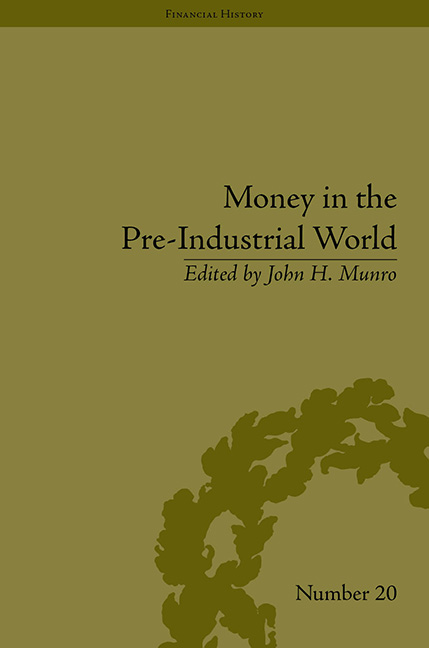Book contents
- Frontmatter
- CONTENTS
- List of Figures and Tables
- List of Contributors
- Introduction
- 1 The Technology and Economics of Coinage Debasements in Medieval and Early Modern Europe: with Special Reference to the Low Countries and England
- 2 From Aurelian to Diocletian: Financing Imperial Recovery by Coinage Debasements and Fiduciary Currencies
- 3 The Making of a Gold Standard: The Ducat and its Offspring, 1284–2001
- 4 Debasement of the Coinage and its Effects on Exchange Rates and the Economy: in England in the 1540s, and in the Burgundian-Habsburg Netherlands in the 1480s
- 5 The Amsterdam Wisselbank's Innovations in the Monetary Sphere: The Role of ‘Bank Money’
- 6 Silver in England 1600–1800: Coinage Outputs and Bullion Exports from the Records of the London Tower Mint and the London Company of Goldsmiths
- 7 The Burdens of Tradition: Debasements, Coinage Circulation and Mercantilist Public Policy Debates in Seventeenth-Century Aragon
- 8 Money or Export Commodity for Asia? American Silver in the Markets of Mexico, Castile and Amsterdam from the Sixteenth to the Eighteenth Century
- 9 Cacao Beans in Colonial México: Small Change in a Global Economy
- 10 Precious Metals, Debasements and Cowrie Shells in the Medieval Indian Monetary Systems, c. 1200–1575
- Notes
- Index
7 - The Burdens of Tradition: Debasements, Coinage Circulation and Mercantilist Public Policy Debates in Seventeenth-Century Aragon
- Frontmatter
- CONTENTS
- List of Figures and Tables
- List of Contributors
- Introduction
- 1 The Technology and Economics of Coinage Debasements in Medieval and Early Modern Europe: with Special Reference to the Low Countries and England
- 2 From Aurelian to Diocletian: Financing Imperial Recovery by Coinage Debasements and Fiduciary Currencies
- 3 The Making of a Gold Standard: The Ducat and its Offspring, 1284–2001
- 4 Debasement of the Coinage and its Effects on Exchange Rates and the Economy: in England in the 1540s, and in the Burgundian-Habsburg Netherlands in the 1480s
- 5 The Amsterdam Wisselbank's Innovations in the Monetary Sphere: The Role of ‘Bank Money’
- 6 Silver in England 1600–1800: Coinage Outputs and Bullion Exports from the Records of the London Tower Mint and the London Company of Goldsmiths
- 7 The Burdens of Tradition: Debasements, Coinage Circulation and Mercantilist Public Policy Debates in Seventeenth-Century Aragon
- 8 Money or Export Commodity for Asia? American Silver in the Markets of Mexico, Castile and Amsterdam from the Sixteenth to the Eighteenth Century
- 9 Cacao Beans in Colonial México: Small Change in a Global Economy
- 10 Precious Metals, Debasements and Cowrie Shells in the Medieval Indian Monetary Systems, c. 1200–1575
- Notes
- Index
Summary
The gradual depreciation of national currencies in pursuit of fiscal and monetary goals, a practice inherited from the late medieval period, was a key feature of monetary policies so often pursued by states in early-modern Europe. Recent studies have highlighted the decisive importance of monetary objectives for these decisions. In 1988, Glassman and Redish, citing the experiences of England and France, contended that the successive depreciations carried out in early-modern Europe – either through enhancements or physical debasements of the currency – were designed to avoid the difficulties and costs generated by progressive undervaluations of the coinage. Meanwhile, the shortage of legal gold, silver and billon money itself created the conditions for this process, encouraging the parallel use of counterfeit and clipped coins. More recently, Sargent and Velde have argued that medieval and early-modern coinage debasements were essentially a rational defensive policy to remedy periodic shortages of ‘small change’, especially when circulating coins became worn over time. Given the need for petty coins in everyday transactions, these debasements were absolutely necessary to avoid economically damaging price deflation.
Both of these arguments implicitly assume the emergence of an ever more coherent monetary policy in the leading European states of this era. However, these states were still in the process of formation, and the authority of the monarch and government differed widely in the various territories under their control. The limited nature of royal power is revealed in the coexistence of two kinds of coins in many seventeenth-century states. Thus, the monarchy would usually issue the principal coinage associated with the state in the regions that were more directly under its control, and from which it obtained the majority of its tax revenues. Other subordinate regions, however, enjoyed greater political autonomy and a separate institutional framework, so that they conserved the right to issue their own domestic coinage, which usually coexisted in the market alongside the principal currency. In these states and regions, the monarchy had to negotiate its monetary policies, as it did its fiscal policies (taxes) with the local public institutions.
- Type
- Chapter
- Information
- Money in the Pre-Industrial WorldBullion, Debasements and Coin Substitutes, pp. 111 - 128Publisher: Pickering & ChattoFirst published in: 2014



